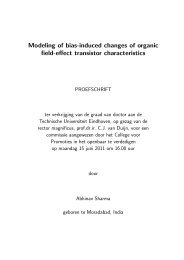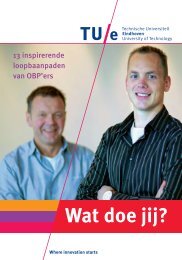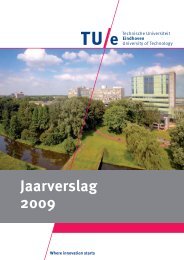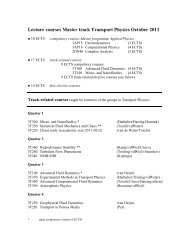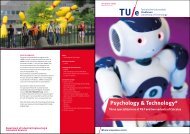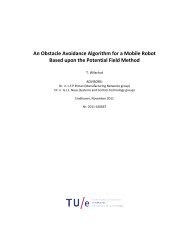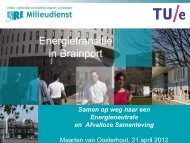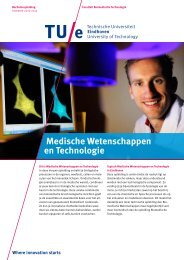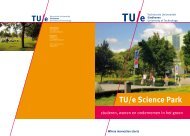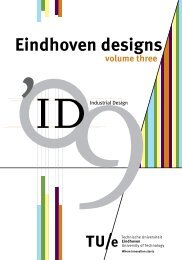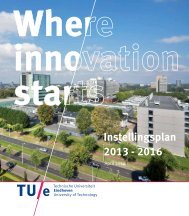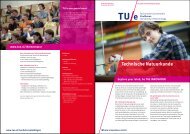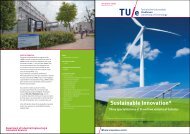SMPE/e - Technische Universiteit Eindhoven
SMPE/e - Technische Universiteit Eindhoven
SMPE/e - Technische Universiteit Eindhoven
Create successful ePaper yourself
Turn your PDF publications into a flip-book with our unique Google optimized e-Paper software.
Where innovation starts<br />
Mission statement:<br />
‘To advance health care through technology<br />
by training academic professionals<br />
in medical physics and engineering’<br />
<strong>SMPE</strong>/e - School of Medical Physics and Engineering <strong>Eindhoven</strong><br />
<strong>SMPE</strong>/e offers post-graduate, professional training programs<br />
in medical physics and medical engineering for MSc<br />
graduates in (applied) physics, (bio-)medical engineering,<br />
and electrical or mechanical engineering.<br />
The hospital-based, university-managed program leads to<br />
a qualification as a Specialist Medical Physicist (2+2 years),<br />
Qualified Medical Physicist (2 years), or Qualified Medical<br />
Engineer (2 years).<br />
<strong>SMPE</strong>/e<br />
A highly-structured and well-organized post-graduate program<br />
in Medical Physics and Medical Engineering is essential for<br />
hands-on training of academic professionals in technology to<br />
advance health care in hospitals and specialized care centers.<br />
The School of Medical Physics and Engineering <strong>Eindhoven</strong><br />
(<strong>SMPE</strong>/e) was established in January 2006 as a universitywide,<br />
post-graduate school for training academic professionals<br />
in medical physics and medical engineering for<br />
careers in health care institutions and industry.<br />
Its curriculum and activities are based on a long-standing<br />
experience – since 1990 – in hospital-based and universitymanaged<br />
training of medical physicists leading to the final<br />
degree of Specialist Medical Physicist. <strong>SMPE</strong>/e manages the<br />
first two years in hospital, together with a senior medical<br />
physicist.<br />
School of Medical Physics and Engineering <strong>Eindhoven</strong><br />
<strong>SMPE</strong>/e - School of Medical Physics and Engineering <strong>Eindhoven</strong><br />
Director:<br />
Prof.dr. Herman C.W. Beijerinck<br />
Co-directors:<br />
Prof.dr.ir. Frans N. van de Vosse<br />
Ir. Herman J. van Kleffens, Medical Physicist<br />
Office:<br />
Department of Applied Physics (NL a.1.76)<br />
<strong>Technische</strong> <strong>Universiteit</strong> <strong>Eindhoven</strong><br />
PO Box 513, 5600 MB <strong>Eindhoven</strong><br />
The Netherlands<br />
T +(31)40 2472134<br />
F +(31)40 2472549<br />
Email: smpee@tue.nl<br />
www.smpee.tue.nl<br />
Photography in co-operation with<br />
- Máxima Medisch Centrum, <strong>Eindhoven</strong> & Veldhoven<br />
- Catharina Ziekenhuis, <strong>Eindhoven</strong><br />
- Elkerliek Ziekenhuis, Helmond<br />
Co-ordination / production<br />
- Ineke Fondse, office manager <strong>SMPE</strong>/e<br />
- Dr.ir. Ivonne M.M. Lammerts, co-ordinator <strong>SMPE</strong>/e<br />
<strong>SMPE</strong>/e<br />
<strong>SMPE</strong>/e<br />
School of<br />
Medical Physics<br />
and Engineering<br />
<strong>Eindhoven</strong><br />
Photography: Bart van Overbeeke, <strong>Eindhoven</strong><br />
Design: vanRixtelvanderPut ontwerpers, <strong>Eindhoven</strong><br />
Printing: Lecturis, <strong>Eindhoven</strong>
<strong>SMPE</strong>/e<br />
School of<br />
Medical Physics<br />
and Engineering<br />
<strong>Eindhoven</strong><br />
National landscape Academic professionals<br />
Training program European landscape<br />
In a European setting, two distinct levels of training of<br />
medical physicists are defined: a Specialist Medical Physicist<br />
(SMP, 2+2 years) and a Qualified Medical Physicist (QMP,<br />
2 years). Details of typical training programs have been<br />
defined by EFOMP (European Federation of Organizations<br />
for Medical Physics) in their Policy Statement #10 published<br />
in 2001. Until now, only the SMP level is operational in The<br />
Netherlands, registered by NVKF (Dutch Society for Medical<br />
Physics), and legalized by a chapter in the civil law code on<br />
Health Care (so-called ‘wet BIG’).<br />
Specialist Medical Physicist<br />
The two-year program for the basic training of Specialist<br />
Medical Physicists is a joint effort of <strong>SMPE</strong>/e and NVKF.<br />
This program has started out as part of the ‘Design and<br />
Technology of Instrumentation (SAI-DTI)’ designer course<br />
of the Stan Ackermans Institute of TU/e. These activities are<br />
now embedded in <strong>SMPE</strong>/e and coordinated by a joint steering<br />
committee with NVKF. The throughput is 4 to 6 SMP<br />
graduates per year with an expected growth to 8 SMP per<br />
year, amounting to 33% of the national output.<br />
Qualified Medical Physicist<br />
Responding to the predictions of the Sminia 2004 report,<br />
<strong>SMPE</strong>/e has taken the lead role in establishing a twoyear<br />
program leading to a degree of Qualified Medical<br />
Physicist as defined by EFOMP. This program coincides<br />
in large with the first two years of the SMP training, with<br />
emphasis on a broad education as a general medical<br />
physicist. We expect that the health care market will be<br />
in great need for these professionals, as part of the<br />
establishment of a pyramidal structure of technology<br />
professionals in hospitals in the next decades.<br />
Qualified Medical Engineer: a new brand<br />
Even more important, <strong>SMPE</strong>/e has started an innovative<br />
two-year training program for MSc graduates in Medical<br />
Engineering. This program leads to a degree of Qualified<br />
Medical Engineer (QME), a new brand of academic professionals<br />
in health care. They are educated to collaborate with<br />
medical doctors to establish more detailed and accurate<br />
diagnoses, using their skills in detailed mathematical modeling<br />
and advanced image analysis. This joint effort will lead<br />
to a better patient selection and treatment planning. The<br />
school caters for a throughput of eight trainees per year.<br />
Hospital-based<br />
All <strong>SMPE</strong>/e training programs – SMP, QMP, and QME – are<br />
hospital-based, which means that the trainees are embedded<br />
in the (hectic) environment of clinical practice of medical<br />
doctors. Each trainee is assigned an advisor in hospital – a<br />
senior medical physicist and/or medical specialist – and an<br />
advisor from <strong>SMPE</strong>/e. The former is responsible for the weekto-week<br />
local feedback to the trainee. The <strong>SMPE</strong>/e advisor<br />
has monthly contacts with the trainee.<br />
University-managed<br />
The economics of <strong>SMPE</strong>/e is based on providing a two-year<br />
all-inclusive training package that contains all curricular components,<br />
project feedback, international travel, contacts with<br />
international industry, and all managerial and administrative<br />
support for the trainees. The trainees are also provided with<br />
a budget for buying academic books, a laptop computer, and<br />
other learning aids. A very important aspect is the quality<br />
assurance by the university in terms of assessment of<br />
positional papers to a tight-loop feedback on projects and<br />
internships. All these activities are part of the two-year<br />
educational package that a hospital purchases from <strong>SMPE</strong>/e.<br />
Employment of the trainee during the two-year training period<br />
is either at the university or at the hospital, depending on<br />
the specific setting and funding.<br />
Joint responsibility<br />
Training programs are only started on demand from a<br />
hospital. A highly competitive entry-level selection of trainees<br />
is a shared responsibility of university and hospital.<br />
The activities of <strong>SMPE</strong>/e fit well into the European scene<br />
of medical physics and medical engineering, as coordinated<br />
and stimulated by EFOMP. In fact, with <strong>SMPE</strong>/e, the<br />
Netherlands is the first European country that has established<br />
a hospital-based university-managed training program.<br />
Most member countries have MSc programs that cater to a<br />
university-based curriculum on medical physics. The tight<br />
professional feedback loop and training of professional skills<br />
during the two years of clinical practice in the hospital is<br />
unique for <strong>SMPE</strong>/e. We expect to coordinate our activities<br />
closely with EFOMP. Also, <strong>SMPE</strong>/e can play an advisory role<br />
in establishing schools in other member countries.<br />
<strong>SMPE</strong>/e<br />
School of<br />
Medical Physics<br />
and Engineering<br />
<strong>Eindhoven</strong>



